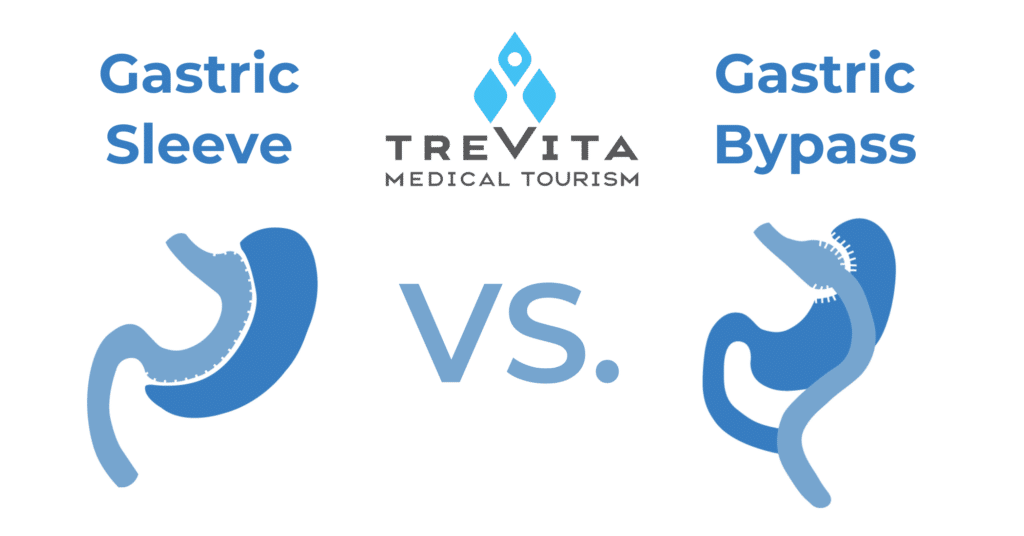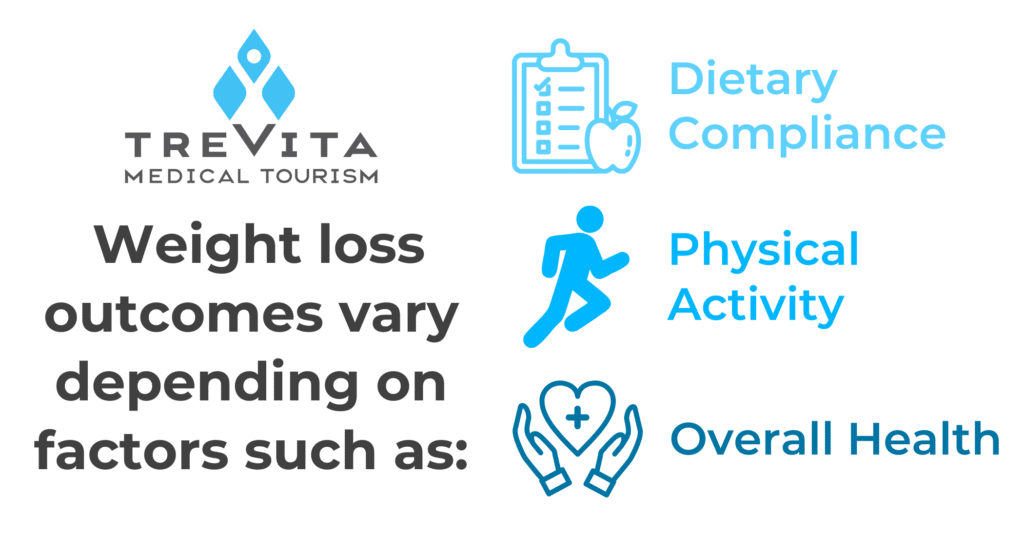A lot of people wonder what’s better between “Gastric Sleeve vs gastric bypass pros and cons” when they’re looking at ways to lose weight through surgery. Gastric sleeve and gastric bypass are two common options, but how can you decide what’s best for you? This guide will help. It looks at the good and bad points of each, what happens during and after the surgery, the risks, how long it takes to get better, and what you need to think about before choosing one. Let’s learn about the difference between Gastric Sleeve and Gastric Bypass to help you become healthier and happier.
Short Summary
- Gastric sleeve and gastric bypass are two different surgeries that help people lose weight.
- Gastric bypass surgery typically leads to faster and more significant weight loss than gastric sleeve surgery but can come with potentially greater risks of side effects.
- Before deciding, it’s very important to think about the risks and problems that could happen with each surgery. You should also consider your body mass index (BMI), any health problems you have, the skills and quality of the person doing the surgery, and the changes you’ll need to make in your way of living to make sure the surgery works well.
Table of Contents

Understanding Gastric Sleeve vs. Gastric Bypass Pros and Cons
Gastric sleeves and gastric bypass surgeries tackle weight loss differently. The gastric sleeve is a restrictive procedure. The gastric bypass is a malabsorptive procedure, limiting the amount of nutrients absorbed by bypassing part of the small intestine.
Both are designed to help clients lose weight by reducing food intake before feeling full. While both procedures are proven effective, there are key differences in how they’re performed and their impact on clients’ lives.
Gastric Sleeve Procedure Pros and Cons
This new pouch reduces the amount of food that can be consumed. This leads to fewer calories being consumed and an improvement in metabolism. One key advantage of gastric sleeve vs. gastric bypass is the decrease in appetite post-surgery. This is due to the removal of the stomach part responsible for producing the hunger hormone ghrelin.
Gastric Bypass Procedure Pros and Cons
When considering gastric bypass vs gastric sleeve surgery, it’s important to note that gastric bypass surgery involves creating a small stomach pouch and bypassing part of the small intestine. This limits the amount of food that can be consumed and reduces the number of calories absorbed by the body. As a result, gastric bypass surgery often leads to faster and more significant weight loss than gastric sleeve surgery.
Comparing Gastric Sleeve and Gastric Bypass Outcomes

When it comes to surgical outcomes, both gastric sleeve and gastric bypass surgeries are effective. They help clients achieve significant weight loss and improvement in obesity-related conditions. These include type 2 diabetes and hypertension.
However, according to the ASMBS, gastric bypass surgery is generally associated with faster and more significant weight loss compared to gastric sleeve surgery.
Weight Loss

In comparing weight loss between gastric sleeve and gastric bypass surgeries, research has shown that gastric bypass clients lose typically between 60 to 80 percent of their excess body weight within the first year to year and a half, whereas gastric sleeve clients tend to lose between 60 to 70 percent of their excess body weight within the first year to year and a half.
The reason gastric bypass surgery often results in more weight loss is that it makes the stomach smaller and also skips a part of the small intestine. This means you can’t eat as much, and your body doesn’t take in as many nutrients from the food.
However, it is important to note that individual weight loss outcomes vary depending on factors such as:
- Adhering to post-op dietary guidelines
- Exercise habits
- Overall health
Ultimately, the success of either weight loss surgery will depend on the patient’s commitment to making lasting lifestyle changes and following the recommendations of their provider.
Excess Body Weight Reduction

When comparing excess body weight reduction between both procedures, gastric sleeve surgery generally results in a 50-70% decrease in excess body weight, while gastric bypass surgery usually produces a 60-80% reduction.
Although gastric bypass surgery usually leads to greater excess body weight reduction, both procedures can lead to significant health improvements. The best choice will depend on individual factors. These include BMI, health conditions, and personal preferences.
Improvement in Conditions
Both gastric sleeves and gastric bypass surgeries can result in significant improvements in obesity-related conditions, such as:
- Type 2 diabetes
- High blood pressure
- High cholesterol
- Obstructive sleep apnea
- Heart disease
- Infertility
The improvement in these conditions will mostly depend on the patient’s commitment to a healthy lifestyle and following postoperative guidelines.
It is important to work closely with a healthcare provider to monitor and manage these conditions throughout the weight loss journey.
Recovery and Lifestyle Changes from Gastric Sleeve and Gastric Bypass Pros and Cons
Getting better and making daily life changes are key to losing weight after gastric sleeve or gastric bypass surgery. Both surgeries need about the same recovery time and require major changes in your diet. This is crucial for long-term success. Making these changes might be hard, but with the right help and advice, you can do it.
Recovery Time
The recovery time for both gastric sleeves and gastric bypass surgeries is generally comparable. Most clients require around 4 to 6 weeks to recover. However, the exact recovery time may vary. It depends on the individual’s health condition, the type of surgery performed, and the patient’s adherence to postoperative guidelines.
These factors can influence the length of recovery time. It is important to discuss them with your doctor. It’s also worth noting that if your job doesn’t involve lifting more than 30-40 pounds or stressing your abdomen, clients can go back to work the next day.

Recovery Time

The recovery time for both gastric sleeves and gastric bypass surgeries is generally comparable, with most clients requiring around 4 to 6 weeks to recover. However, the exact recovery time may vary depending on the individual’s health condition, as well as other factors such as the type of surgery performed and the patient’s adherence to postoperative guidelines.
These factors can influence the length of recovery time, so it is important to discuss them with your doctor. It is important to note that if your job does not include lifting upwards of 30-40 pounds or putting stress on your abdomen, clients can go back to work the next day.

Dietary Changes
Significant dietary changes are required after both gastric sleeves and gastric bypass surgeries. This is due to the reduced stomach size and, in gastric bypass, bypassing part of the small intestine. Adherence to a strict post-surgery diet and smaller meal portions is essential. This is key for long-term weight loss and overall health.
Clients will need to prioritize high-quality, nutrient-dense foods and consume them in smaller, more frequent meals throughout the day.
Factors to Consider When Choosing a Gastric Sleeve or Gastric Bypass Pros and Cons
When choosing between gastric sleeve and gastric bypass surgeries, there are multiple factors to consider, such as:
- BMI
- Health Condition
- The experience of the provider
- Recommendations of the surgeon
By taking these factors into account, clients can make a more informed decision about which procedure is best suited to their individual needs and goals.
It is important to remember that both procedures have their own risks and benefits, and the decision should be made on a case-by-case basis.
BMI and Health Conditions
BMI and health conditions play a significant role in determining which bariatric surgery is most appropriate for an individual. Gastric Sleeve Surgery is generally recommended for individuals with a BMI between 35 and 40, while gastric bypass surgery is typically recommended for those with a BMI of 40 or above.
However, the best choice may vary depending on other health conditions, such as diabetes, high blood pressure, sleep apnea, acid reflux, and heart disease.
Surgeon Experience and Recommendations
Another important factor in choosing between gastric sleeves and gastric bypass surgeries is the surgeon’s experience and recommendations.
The optimal choice may vary based on personal considerations. Taking into account the surgeon’s experience and recommendations is essential when deciding.
Inquire about the surgeon’s experience with both procedures. This ensures that they are well-equipped to perform the chosen surgery.
Why Choose TreVita Medical Tourism
If you’re considering gastric sleeves or gastric bypass surgery, TreVita Medical Tourism is an excellent choice. They offer comprehensive and cost-effective bariatric surgery packages in Tijuana, Mexico. TreVita provides expert care and support throughout your weight loss journey.
With board-certified surgeons and a secure, efficient process, you can trust TreVita. They strive to deliver the best possible outcomes for your bariatric surgery. Their experienced team will guide you through each step. This includes pre-operative care to post-operative support. They ensure you have the tools and resources needed for lasting weight loss and improved health.
Final Considerations: Gastric Sleeve vs. Gastric Bypass Pros and Cons
In conclusion, both gastric sleeves and gastric bypass surgeries are effective for surgical weight loss. The choice between the two depends on factors like BMI, health conditions, and the surgeon’s experience and recommendations. By weighing the pros and cons of each procedure and working with a knowledgeable healthcare provider, clients can decide what’s best for them. With dedication and commitment to a healthy lifestyle, they can achieve lasting weight loss and improved health.









